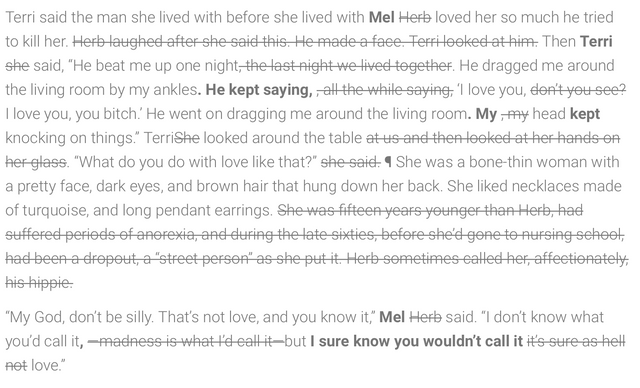A common error I see with young writers is that they do not spend enough (or any!) time revising their own work before sending it to an editor or a friend for review. After editing stories for 12 years and eight years professionally, I am here to tell you: Take your story as far as you possibly can before submitting it to an editor. You should be spending the same amount of time revising your work as you did writing it. Times three!

The best discoveries happen when you are combing through something you’ve already written, striking out uninspired words or details, and realizing with precision what it is you’re actually trying to say. “Fiction does not spring into the world fully grown, like Athena. It is the process of writing and rewriting that makes a fiction original, if not profound” (John Gardner, The Art of Fiction).
During the revision process, connections form that you didn’t see at first. Subtleties in phrases and metaphors evolve. Your voice becomes prevalent. Suddenly, your story is achieving a depth and fullness it would have missed had you not spend time mining for it.
Your editor can’t do this part for you. She can provide you with ideas, show you areas that are lacking in originality and need more development. But she can’t really dive in deeply until you have done so first.
When you’ve taken your story as far as you can, your editor can work freely in honing the story that is already prevalent. She can come in with fresh eyes to pull out even more connections, metaphors, parallels, imagery—i.e. the things that make your story original and unique. She can touch up phrases using words that fit the voice because it has been clearly established. She can comfortably ask you to consider changing a long text of narrative into a scene with dialogue to give it more intrigue. She will know where to speed things up or slow them down based on the rhythm and pacing you’ve spun into motion.
Not a seasoned reviser yet? Here are three easy steps to get you started:
Give your story some space. If you spent all day writing yesterday, then wait a day before you edit so you can come back to the page with a fresh mind and perspective.
Read your story out loud. Are there parts you stumble over? Would a simple word change fix the flow? Could you delete the phrase that is slowing things down without sacrificing clarity? Is it even needed?
Highlight any vague language. This is a two-step process, with the first part beginning with you just as an observer marking any non-specific language, phrases, or imagery. Simply highlight areas you know could be improved through vivid writing, and then spend a separate session finding solutions for those areas you’ve marked. How can you make an idea more interesting? What new image or metaphor can you bring to the page that would add to the story, voice, or tension?
Here’s what a good revision can look like:

(source: screenshot of article in A Bad Penny Review, http://www.abadpennyreview.com/murdering-your-darlings-raymond-carvers-revisions/)
To write memorably, you must learn to edit remarkably. Tighten your writing. Delete unnecessary phrases, words, remarks, commentary. And then we can talk about what to look for when hiring a professional editor.
That's great content. I never considered that editing my stuff would/should take 3x as long! Everything I will take to heart. Thanks for sharing :)
Downvoting a post can decrease pending rewards and make it less visible. Common reasons:
Submit
Thanks for reading, Captainbob! I appreciate it and hope it’s valuable information for when you write/edit/post. <3
Downvoting a post can decrease pending rewards and make it less visible. Common reasons:
Submit
Also, I recommend reading Raymond Carver’s essay, “A Storyteller’s Shoptalk,” published by the NY Times for more insight on the relationship between writing/re-writing. http://www.nytimes.com/books/01/01/21/specials/carver-shoptalk.html
"Evan Connell said once that he knew he was finished with a short story when he found himself going through it and taking out commas and then going through the story again and putting commas back in the same places. I like that way of working on something. I respect that kind of care for what is being done. That’s all we have, finally, the words, and they had better be the right ones, with the punctuation in the right places so that they can best say what they are meant to say."
Downvoting a post can decrease pending rewards and make it less visible. Common reasons:
Submit